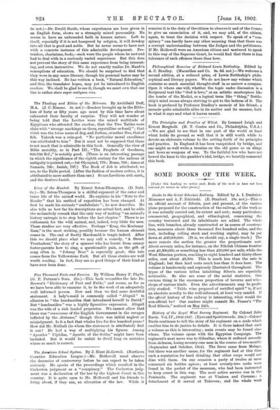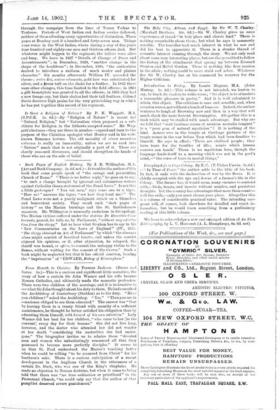History of the Royal West Surrey Regiment. By Colonel John
Davis. Vol. IV., 1802-1837. (Eyre and Spottiswoode. 24s.)—Colonel Davis continues to tell the story of his regiment on a scale which enables him to do justice to details. It is there indeed that such a volume as this is interesting ; main events may be found else- where. The volume opens with the Egyptian Campaign. The regiment's next move was to Gibraltar, where it suffered severely from sickness, losing seventy-one men in the course of two months (September and October, 1804). The fever came from Malaga, but there was another cause, for the regiment had at this time such a reputation for head drinking that other corps would not dine with them. On one occasion a party of twelve at mess consumed six bottles apiece ; at least seventy-two corks were found in the pocket of the messman, who had been instructed to keep count in this way. The next active service was in the Peninsula. The regiment was at Vimiera and Corunna; detachment of it served at Talavera; and the whole went
through the campaign from the lines of Torres Vedras to Toulouse. Periods of West Indian and Indian service followed, neither of them affording many opportunities of distinction. Three years at Bombay cost it a hundred and forty-seven men. Things were worse in the West Indies, where during a stay of five years four hundred and eighty-one men and thirteen officers died. But whatever might happen to the regiment, the tailors were alive and busy. We have in 1827 "Details of Change of Dress and Accoutrements " ; in December, 1829, "another change in the shape of the headdress " ; in December, 1830, "the authorities desired to introduce a uniform of much neater and plainer character." Six months afterwards William IV. ascended the throne ; autre Roi, autres vetements, gold lace was substituted for silver, and a green tuft on the shako for a feather. In 1832 there were other changes, this time limited to the field officers ; in 1883 a gilt breastplate was granted to all the officers ; in 1835 they had a new forage cap, but their shakos lost their tall feathers. Colonel Davis deserves high praise for the very painstaking way in which he has put together this record of his regiment.











































 Previous page
Previous page